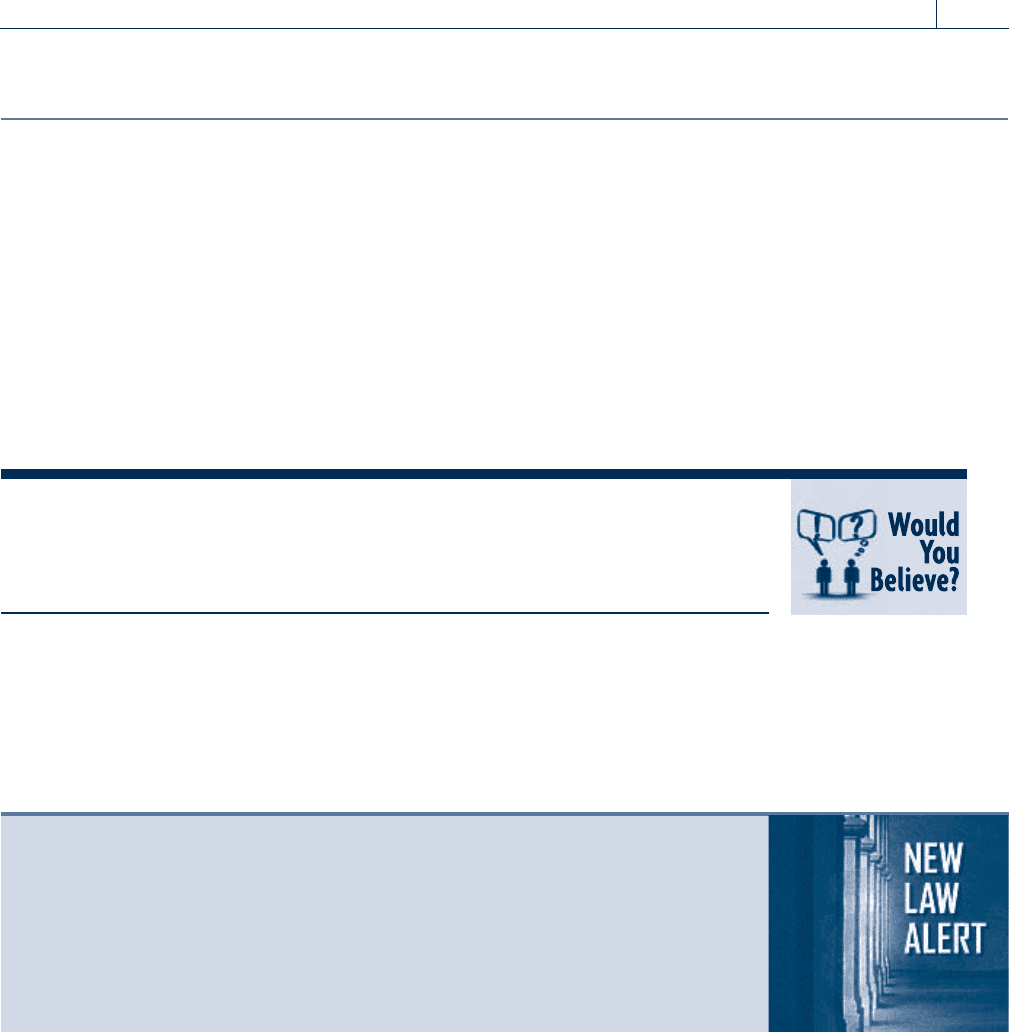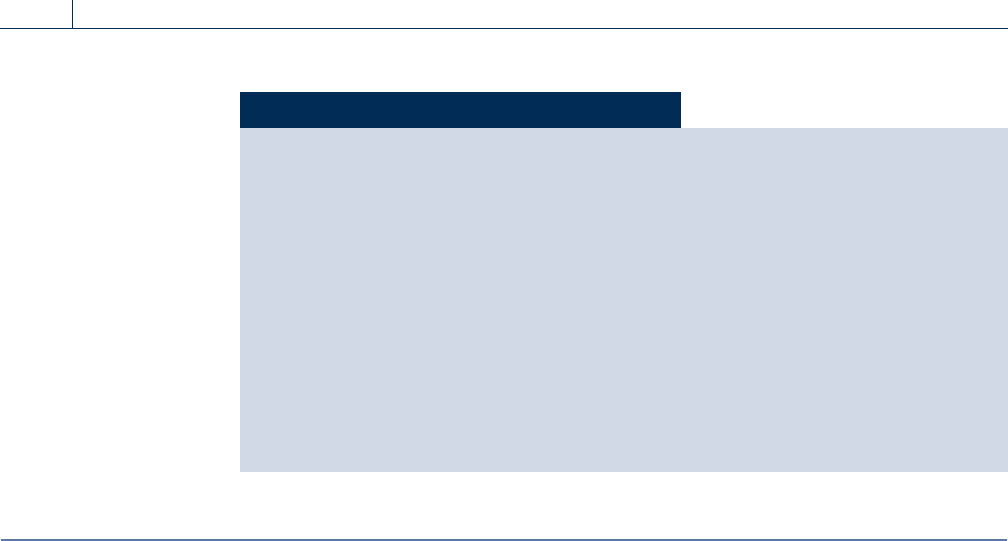Whittenburg Gerald E., Altus-Buller Martha. Income Tax Fundamentals
Подождите немного. Документ загружается.


FIGURE 12.3
Section 12.2
The Audit Process 12-9
Copyright 2010 Cengage Learning. All Rights Reserved. May not be copied, scanned, or duplicated, in whole or in part. Due to electronic rights, some third party content may be suppressed from the eBook and/or eChapter(s).
Editorial review has deemed that any suppressed content does not materially affect the overall learning experience. Cengage Learning reserves the right to remove additional content at any time if subsequent rights restrictions require it.

SECTION 12.3
INTEREST AND PENALTIES
Taxpayers are charged interest on underpayments of taxes, and in some cases the IRS pays
interest to taxpayers when they overpay their taxes. Usually, these interest charges or pay-
ments result from the settlement of a tax liability for a prior year’s tax return. For example,
when an IRS audit results in the taxpayer paying additional taxes for a prior tax year, the
IRS will cha rge the taxpayer interest on the amount of additional taxes from the original
due date to the date of payment of the tax. If the audit results in a refund, interest will
be paid to the taxpayer based on the amount of the refund. The IRS also imposes a non-
deductible penalty based on amounts of underpayments of estimated taxes for the current
tax year (see Chapter 9), but a taxpayer is not paid interest on a refund arising from an over-
payment of estimated taxes during the current tax year.
The interest rate applicable to underpayments and overpayments of taxes is adjusted
each quarter based on the short-term federal rate. The rate is equal to the federal short-
term rate plus three percen tage points. Interest is compounde d daily except when calculat-
ing the penalty for underpayment of estimated taxes by individuals and corporation s. In
calculating t he penalty for underpayment of estimated taxes, the penalty is cal culated as
simple interest.
The r ate of interest for selected recent periods is as follows:
Time Period Rate
1st quarter 2010 4%
2nd quarter 2010 4%
3rd quarter 2010 4%
4th quarter 2010 4%
Tables are available from the IRS for performing the actual calculation of interest owed
from or due to taxpayers. Interest paid on an underpayment of tax is considered consumer
interest and, therefore, no deduction is allowed (see Chapter 5). The penalty for underpay-
ment of estimated tax is calculated as interest but is a nondeductible penalty. Interest
received on an overpayment is income in the year the payment is received.
EXAMPLE Chow pays $2,000 of interest in 2010 for an underpayment of taxes
on his 2006 tax return. The $2,000 is not deductible since no deduc-
tion is allowed for consumer interest. N
EXAMPLE John receives $700 of interest income on the overpayment of his
taxes on his 2007 tax return. The $700 interest is income in the year
it is received by John. N
Self-Study Problem 12.2
Indicate whether the following statements are tr ue or false by circling the
appropriate letter.
TF1. The IRS uses computers to select tax returns for most audits.
TF2. An office audit is done at the taxpayer’s office.
TF3. TCMP audits are not performed currently.
TF4. An audit may result in a refund.
TF5. A taxpayer cannot appeal the results of an IRS audit.
12-10 Chapter 12
Tax Administration and Tax Planning
Copyright 2010 Cengage Learning. All Rights Reserved. May not be copied, scanned, or duplicated, in whole or in part. Due to electronic rights, some third party content may be suppressed from the eBook and/or eChapter(s).
Editorial review has deemed that any suppressed content does not materially affect the overall learning experience. Cengage Learning reserves the right to remove additional content at any time if subsequent rights restrictions require it.

The tax law contains various penalties to ensure taxpayers accurately report and pay
their taxes. Penalty payments are considered an addition to the amount of the taxes an d,
therefore, are not deductible. Several of the major taxpayer penalties are described in the
following paragraphs.
The Failure-to-File and Failure-to-Pay Penalties
If a taxpayer does not file a tax return on the due date (including extensions), he or she is
subject to a penalty equal to 5 percent of the tax due with the return for every month or
portion of a month the return is late. The amount of the penalty for failure to file, ho wever,
is limited to a maximum of 25 percent of the amount of taxes due with the tax return. In the
event the failure to file is fraudulent, the penalty is increased from 5 percent for each month
or portion thereof to 15 percent, and the maximum penalty is increased from 25 percent to
75 percent. Also, if the taxpayer fails to file the return within 60 days of its due date, the min-
imum failure-to-file penalty is the lesser of $135 or the total amount of the taxes due with the
tax return. The failure-to-file penalty will not be assessed if the taxpayer can demonstrate
that he or she had ‘‘reasonable cause’’ for failing to file the tax return on time.
Taxpayers are also subject to a penalty for failure to pay the amount of the taxes due on the
due date of their tax return. The penalty for failure to pay is ½ of 1 percent of the amount of
taxes due for every month or portion of a month that the payment is late, up to a maximum of
25 percent of the amount of taxes due. The penalty increases to 1 percent per month begin-
ning 10 days after a notice of levy has been given to the taxpayer. If both the failure-to-file and
the failure-to-pay penalties apply, the failure-to-file penalty is reduced by the amount of the
failure-to-pay penalty. Both the failure-to-file and the failure-to-pay penalties are zero if there
is no tax due or if a refund is due from the IRS on the late tax return.
EXAMPLE Nancy filed her tax return 3½ month s after the due date, and she had
not requested an extension of time to file. The failure to file was not
due to fraud. She included with her late retu rn a check for $2,000,
which was the balance of the tax she owed. Disregarding interest, her
penalties are calculated as follows:
Failure-to-pay penalty $ 40
(.5% $2,000) 4 months
Plus:
Failure-to-file penalty $400
(5% $2,000) 4 months
Less: Failure-to-pay penalty
(40)
Net failure-to-file penalty
360
Total penalties
$400
Note that in general, the maximum total penalty possible in this
example is 25 percent of $2,000, or $500. N
Accuracy-Related Penalty
The tax law imposes a penalty of 20 percent of the applicable underpayment due to (l) neg-
ligence or disregard of rules or regulations, (2) a substantial understatement of income tax,
or (3) a substantial valuation overstatement, as well as certain other understatements of
income tax. Negligence includes the failure to make a reasonable attempt to comply
with the tax law. For example, the penalty could be imposed on a taxpayer who deducts
a personal expenditure as a business expense. A substantial understatement of income tax
Section 12.3
Interest and Penalties 12-11
Copyright 2010 Cengage Learning. All Rights Reserved. May not be copied, scanned, or duplicated, in whole or in part. Due to electronic rights, some third party content may be suppressed from the eBook and/or eChapter(s).
Editorial review has deemed that any suppressed content does not materially affect the overall learning experience. Cengage Learning reserves the right to remove additional content at any time if subsequent rights restrictions require it.

occurs where the required amount of tax exceeds the tax shown on the taxpayer’s return by
the greater of 10 percent of the amount of tax that should be shown on the return or $5,000
($10,000 for corporate taxpayers other than S corporations). A substantial valuation over-
statement occurs when the value of property is 200 percent or more of the correct valua-
tion. For example, a taxpayer who inflates the value of depreciable property to generate
additional depreciation deductions may be subject to this penalty. The accuracy-related
penalty applies only if the taxpayer has filed a return. In addition, if the taxpayer can dem-
onstrate that he or she has reasonable cause for the understatement of tax and that he or she
acted in good faith, the penalty will not be assessed.
EXAMPLE Kim underpaid her taxes for the curren t year by $15,000 due to
negligence. Kim’s penalty for negligence under the accuracy-related
penalty is calculated as follows:
Negligence penalty (20% $15,000)
$3,000 N
Fraud Penalty
The tax law also contains provisions for penalties for filing fraudulent tax returns. The fraud
penalty is equal to 75 percent of the amount of underpayment of taxes attributable to fraud.
For the IRS to impose the fraud penalty, it must be shown by a ‘‘preponderance of evi-
dence’’ that the taxpayer had an intent to evade taxes; however, once the IRS establishes that
any portion of an underpayment of taxes is due to fraud, the entire underpayment is
assumed to be attributable to fraud unless the taxpayer establishes otherwise. The tax law
does not provide clear rules for what constitutes fraud; however, what is clearly mere neg-
ligence by a taxpayer will not cause this penalty to be imposed. When the fraud penalty is
applicable, the accuracy-related penalty cannot be imposed. The fraud penalty will be
applied only where the taxpayer has actually filed a return. Like the accuracy-related pen-
alty, the fraud penalty will not be assessed if the taxpayer can demonstrate reasonable
cause for the underpayment of tax and the taxpayer acted in good faith.
EXAMPLE Jeff has a $20,000 tax deficiency because of civil fraud. Interest on
this underpayment amounts to $8,000. Jeff’s total amount due on
this underpayment is calculated as follows:
Tax deficiency $20,000
Fraud penalty (75% $20,000) 15,000
Interest
8,000
Total due
$43,000
The interest is not deductible due to the disallowance of deductions
for consumer interest. The fraud penalty is also not deductible. N
According to a recent IRS poll, 17 percent o f Americans feel cheating on taxes
is acceptable. Experts agree that tax chea ting is a significant problem for the
IRS, which must enforce the laws, and for honest taxpayers who pay more in
taxes than they would otherwise have to. It is generally believed that tax eva-
sion and noncompliance are costing the government more than a quarter of a
trillion dollars in lost revenue each year ( Wall Street Journal, ‘ ‘Tax Report,’’
February 6, 2008).
12-12 Chapter 12
Tax Administration and Tax Planning
Copyright 2010 Cengage Learning. All Rights Reserved. May not be copied, scanned, or duplicated, in whole or in part. Due to electronic rights, some third party content may be suppressed from the eBook and/or eChapter(s).
Editorial review has deemed that any suppressed content does not materially affect the overall learning experience. Cengage Learning reserves the right to remove additional content at any time if subsequent rights restrictions require it.

Miscellaneous Penalties
The tax law contains many other penalties applicable to taxpayers. The following are exam-
ples of such penalties:
A civil penalty of $500 and a criminal penalty of $1,000 are imposed for filing false
withholding information.
An immediate $5,000 penalty can be assessed against a taxpayer who files a ‘‘frivo-
lous’’ tax return (or document) as a tax protest.
A tiered penalty system dependent on the timeliness of correction and filing of
information returns is imposed for failing to file correct information returns. The
penalty is assessed at $15 per return, $75,000 annual maximum, where the failure
to file is corrected within 30 days after the required filing date; $30 per return,
$150,000 annual maximum, where the failure is corrected after 30 days, but before
August 1 of the calendar year of the fili ng date; or $50 per return, $250,000 annual
maximum, where the failure to file is not corrected prior to August 1 of the calendar
year of the required filing date. The maximum annual penalty is reduced for tax-
payers with gross receipts of $5,000,000 or less.
A $50 penalty per occurrence (annual maximum of $100,000) is imposed for failing
to provide timely payee information returns.
Employers are subject to a penalty of 2, 5, or 10 percent of the amount of payroll
taxes not deposited on time, depending on the number of days the taxes remain
undeposited. A 15 percent penalty may apply where taxes remain undeposited after
a delinquency notice has been presented to the taxpayer.
Taxpayers are subject to a penalty for failure to pay estimated taxes. The penalty is
calculated using the interest rates for the period of underpayment (but it is not
deductible as interest).
Taxpayers are subject to a penalty for issuing a ‘‘bad’’ check, unless the taxpayer can
demonstrate that the check was issued in good faith. The penalty is equal to 2 percent
of the amount of the check. If the check is less than $1,250, then the penalty is the
lesser of $25 or the amount of the check.
According to human rights group Amnesty International, tax fraud in China is a
crime which may be punishable by death.
Self-Study Problem 12.3
Part a
Linda filed her tax return 2 months late. The tax paid with the return amounts
to $3,000. What is Linda’s total penalty for f ailure to file and failure to pay,
assuming the failure to file is not fraudulent?
$ ____________
Part b
Kim underpaid her taxes by $10,000 due to negligence. What is Kim’s penalty
for negligence?
$ ____________
Part c
Using the same information in Part b, what is the amount of the penalty if the
underpayment were determined to be due to civil fraud?
$ ____________
Section 12.3
Interest and Penalties 12-13
Copyright 2010 Cengage Learning. All Rights Reserved. May not be copied, scanned, or duplicated, in whole or in part. Due to electronic rights, some third party content may be suppressed from the eBook and/or eChapter(s).
Editorial review has deemed that any suppressed content does not materially affect the overall learning experience. Cengage Learning reserves the right to remove additional content at any time if subsequent rights restrictions require it.

SECTION 12.4
STATUTE OF LIMITATIONS
The statute of limitations is the time period within which an action may be taken by the
IRS on a tax return. After the statute of limitations has run out on a given tax return,
the government cannot assess additional taxes and the taxpayer cannot amend the return
to request a refund. In general, the statute of limitations for a tax return runs for 3 years
from the date the tax return was filed or the return due date, whichever is later.
EXAMPLE Norm files his 2010 tax return on March 20, 2011. Unless an exception
discussed below applies, the IRS has until April 15, 2014, to assess any
additional taxes. N
Exceptions
The tax law contains several exceptions to the general rule of a 3-year statute of limitations.
Several of these special rules are summarized below:
If a fraudulent tax return is filed or no return is filed, there is no statute of limita-
tions. The IRS may assess a tax deficiency at any time in the future.
If a taxpayer omits an amount of gross income in excess of 25 percent of the gross
income shown on the return, then the statute of limitations is increased to 6 years.
For example, if a tax return with gross income of $40,000 contains an omission of
over $10,000 (25 percent of $40,000) of gross income, the statute of limitations is
increased to 6 years.
The statute of limitations for the deduction of a bad debt or worthless securities is
7 years. This limitation applies only to the bad debt deduction or the worthless security
deduction; all other items on the tax return would normally close out after 3 years.
Besides these exceptions, the statute of limitations may be extended by mutual consent
of the IRS and the taxpayer. This extension is for a specific time period and is made by
signing the appropriate form in the Form 872 series. An extension is generally used
when the statute of limitations is about to lapse and an audit has not been completed.
If a tax deficiency has been assessed by the IRS within the period of the statute of lim-
itations, then the government has 10 years from the date of assessment to collect the tax due.
An IRS study shows that many taxpayers lose refunds because they fail to fi le
their returns within the statute of limitations for claiming a refund, which
can be either 2 or 3 years depending on the circumstances. The IRS denies mil-
lions of dollars in refunds each year which were claimed in delinquent returns.
Self-Study Problem 12.4
Indicate whether the following statements are tr ue or false by circling the
appropriate letter.
TF1. The general statute of limitations for a tax return is 3 years.
TF2. The statute of limitations for a bad debt deduction on a tax return is
6 years.
TF3. The statute of limitations for a fraudulent tax return is 7 yea rs.
TF4. The special statute of limitations for a tax return that omits income
greater than 25 percent of gross income is 6 years.
TF5. For the deduction of worthless securities, the statute of limitations
is 7 years.
12-14 Chapter 12
Tax Administration and Tax Planning
Copyright 2010 Cengage Learning. All Rights Reserved. May not be copied, scanned, or duplicated, in whole or in part. Due to electronic rights, some third party content may be suppressed from the eBook and/or eChapter(s).
Editorial review has deemed that any suppressed content does not materially affect the overall learning experience. Cengage Learning reserves the right to remove additional content at any time if subsequent rights restrictions require it.

SECTION 12.5
PREPARERS, PROOF, AND PRIVILEGE
Tax Practitioners
Many taxpayers find it desirable or necessary to have their tax returns prepared by a tax
practitioner. Tax practitioners include commerci al preparers, enrolled agent s, attorneys,
and certified public accountants (CPAs). Commercial preparers generally prepare noncom-
plex returns of individuals, small corporations, and partnerships. Enrolled agents are indi-
viduals who have passed an IRS exam and are allowed to represent clients at IRS
proceedings, as well as prepare tax returns. Attorneys and CPAs are individuals who
have met education, examination, and experience requirements and are licensed to practice
in their respective professions. CPAs and attorneys normally work with complex tax returns
of individuals, corporations, partnerships, estates, and trusts. They also provide tax-
planning advice to aid their clients in minimizing the amount of their taxes.
According to the IRS, more than 60 percent of returns filed in the last several
years have been prepared and signed by professional preparers. Many tax law-
makers in Congress also hire professional preparers rather than wrestle with the
laws they have written.
The IRS and the tax law do not provide for a minimum level of education. An individual can
prepare tax returns or give tax advice, regardless of his or her educational background or
level of competence. However, under IRS Circular 230, only enrolled agents, attorneys,
and CPAs have the right to represent clients in tax proceedings with the government. Com-
mercial preparers can represent their clients before the IRS only to a limited extent.
The IRS plans to begin regulating all individuals who charge money to prepare
tax returns by requiring registration, competency exams, and continuing educa-
tion. Attorneys, CPAs, and enrolled agents will be exempt from the new test-
ing and education requirement s. The education and testin g requirements for
other preparers will be implemented beginning in 2011 at the earliest. How-
ever, all preparers, including CPAs, enrolled agents, and attorneys, will be
required to pay a fee and register if the y will be preparing any tax return for
a fee after December 31, 2010.
Under the tax law, any person who prepares a tax return, including non-income tax
returns (e.g., excise tax returns), for compensation is a ‘‘tax return preparer.’’ The tax
law has various penalty provisions applicable to tax return preparers. These penalties are
designed to help the IRS regulate the p reparation of tax returns; the more significant
ones for tax returns filed for years starting in 2010 are described below:
$50 for failing to sign a tax return or failing to furnish the preparer’s identifying
number, $25,000 annual maximum.
$50 for each failure to keep a copy of the prepared return or include the return on a
list of taxpayers for whom returns have been prepared, $25,000 annual maximum.
$50 for failing to provide a taxpayer a copy of the tax return prepared, $25,000
annual maximum.
$500 for endorsing or cashing a refund check issued to a taxpayer.
Section 12.5
Preparers, Proof, and Privilege 12-15
Copyright 2010 Cengage Learning. All Rights Reserved. May not be copied, scanned, or duplicated, in whole or in part. Due to electronic rights, some third party content may be suppressed from the eBook and/or eChapter(s).
Editorial review has deemed that any suppressed content does not materially affect the overall learning experience. Cengage Learning reserves the right to remove additional content at any time if subsequent rights restrictions require it.

Greater of $1,000 or 50 percent of the income derived (or to be derived) by the tax
return preparer for an undisclosed unrealistic position on a return which does not
meet a ‘‘substantial authority’’ standard, and which the preparer knew or reasonably
should have known about.
Greater of $5,000 or 50 percent of the income derived (or to be derived) by the tax
return preparer for each return in which the preparer willfully attempts to understate the
amount of the taxpayer’s tax liability, or each return in which an understatement is due
to the preparer’s reckless or intentional disregard of rules or regulations, reduced by the
amount of the $1,000 (or 50 percent) penalty for unrealistic positions (discussed above).
$1,000 ($10,000 for corporate returns) for each return or document filed in aiding
or abetting a taxpayer in understating a tax liability.
For each separate activity (sale of an interest, organization of an entity, etc.), the
lesser of $1,000 or 100 percent of the gross income derived by the promoter from
promoting an ‘‘abusive tax shelter.’’
Burden of Proof
In most litigation, the party initiating the case has the burden of convincing the court that
he or she is correct with respect to the issue. Historically, how ever, in most civil tax cases,
the Internal Revenue Code placed the burden of proof on the taxpayer, whether or not he
or she initiated the case, except in cases involving such items as hobby losses , fraud with
intent to evade tax, and the accumulated earnings tax.
In the IRS Restructuring and Reform Act of 1998, the tax law was changed to shift the
burden of proof to the IRS in many situations. The IRS now has the burden of proof in any
court proceeding on an income, gift, estate, or generation-skipping tax liability with
respect to factual issues, provided the taxpayer (1) introduces credible evidence of the fac-
tual issue, (2) maintains records and substantiates items as presently required under the
Code and Regulations, and (3) cooperates with reasonable IRS requests for meetings, inter-
views, witnesse s, information, and documents. For corporations, trusts, and partnerships
with net worth exceeding $7 million, the burden of proof remains on the taxpayer. The
new rules apply only to those IRS-taxpayer disputes arising in connection with audits
started after the 1998 Act was signed into law.
The burden of proof also automatically shifts to the IRS in two situations:
if the IRS uses statistics to reconstruct an individual’s income, or
if the court proceeding against an individual taxpayer involves a penalty or addition to tax.
Tax Confidentiality Privilege
The 1998 Act also extended the existing attorney-client privilege of con fidentiality in tax
matters to nonattorneys authorized t o practice before the IRS (e.g., CPAs and enrolled
agents). The nonattorney-client privilege may be asserted only in a noncriminal tax pro-
ceeding before the IRS or federal courts . Also, the nonattorney-client privilege does not
extend to written communications between a tax practitioner and a corporation in connec-
tion with the promotion of any tax shelter.
CPAs and enrolled agents need to understand the rules regarding tax confidentiality as
they have been applied to lawyers to be aware of the tax privilege limits. For example, tax
privileged communication usually does not apply to the preparation of tax returns, the giv-
ing of accounting or business advice, or to tax accrual workpapers. Also, unlike the general
attorney-client privilege, the nonattorney-client privilege does not automatically apply to
state tax situations.
12-16 Chapter 12
Tax Administration and Tax Planning
Copyright 2010 Cengage Learning. All Rights Reserved. May not be copied, scanned, or duplicated, in whole or in part. Due to electronic rights, some third party content may be suppressed from the eBook and/or eChapter(s).
Editorial review has deemed that any suppressed content does not materially affect the overall learning experience. Cengage Learning reserves the right to remove additional content at any time if subsequent rights restrictions require it.

SECTION 12.6THE TAXPAYER BILL OF RIGHTS
Over the years, the news media carried many ‘‘horror stories’’ about taxpayers who claimed
they had been abused by the IRS. As a result of this publicity, in 1988 Congress passed a set
of provisions referred to as the Taxpayer Bill of Rights. The Taxpayer Bill of Rights has
been amended several times since it was originally passed by Cong ress. This set of provi-
sions requires the IRS to inform taxpayers of their righ ts in dealing with the IRS, and
expands taxpayers’ rights and remedies when they are involve d in disputes with the IRS.
The provisions of the Taxpayer Bill of Rights are summarized in IRS Publication 1,
which is reproduced on pages 12-19 and 12-20. Also note, Publication 1 directs taxpayers
to other IRS publications with more details on specific taxpayer rights.
The first part of this publication explains some of your most important rights as a tax-
payer. The second part explains the examination, appeal, collection, and refund processes.
Section 12.6
The Taxpayer Bill of Rights 12-17
Self-Study Problem 12.5
Indicate whether the following statements are true or false by circling the
appropriate letter.
TF 1. Only certified public accountants may represent taxpayers before
the IRS.
TF 2. A college degree is required to prepare tax returns for compensation.
TF 3. Only attorneys may prepare corporate tax returns.
TF 4. The tax preparer penalty for filing a document aiding and abetting an
individual taxpayer in the understatement of a tax liability is $1,000.
TF 5. The tax preparer penalty for endorsing a taxpayer’s refund check is
$500.
TF 6. The tax preparer penalty for failing to provide a copy of a tax
return to a taxpayer is $50.
TF 7. For audits begun after 1998, if the IRS uses statistics to reconstruct an
individual taxpayer’s income, the burden of proof is on the taxpayer.
TF 8. For corporations, trusts, and partnership s with net worth over $7
million, the burden of proof is on the IRS in civil tax matters.
TF 9. CPAs and enrolled agents have tax privileged com munication only
in noncriminal proceedings before the IRS or federal courts.
TF10. If an individual taxpayer does not cooperate with reasonable IRS
requests for meetings, interviews, witnesses, information, and docu-
ments, the burden of proof in a tax matter is on the taxpayer.
Self-Study Problem 12.6
Indicate whether the following statements are true or false by circling the
appropriate letter.
TF1. Taxpayers have the right to represent themselves or, with proper
written authorization, have someone else represent them.
TF2. The IRS will waive penalties when allowed by law if taxpayers can
show they acted reasonably in good faith or relied on incorrect
advice from an IRS employee.
Copyright 2010 Cengage Learning. All Rights Reserved. May not be copied, scanned, or duplicated, in whole or in part. Due to electronic rights, some third party content may be suppressed from the eBook and/or eChapter(s).
Editorial review has deemed that any suppressed content does not materially affect the overall learning experience. Cengage Learning reserves the right to remove additional content at any time if subsequent rights restrictions require it.

SECTION 12.7
TAX PLANNING
The process of arranging one’s financial affairs to minimize one’s overall tax liability is
often referred to as tax planning. There is nothing wrong with tax planning to avoid tax,
provided legal methods are used. Judge Learned Hand best stated the doctrine of tax plan-
ning in 1947 when he wrote:
‘‘Ov er and over again, courts hav e said there is nothing sinister in so arranging one’s
affairs as to keep taxes as low as possible. Everybody does so, rich or poor, and all do
right, for nobody owes any public d uty to pay more than the law demands: taxes are
enforced extractions, not voluntary contributions.’’ Commissioner v. Newman , 159 F.2d
848 (CA-2, 1947).
When illegal methods are used to reduce tax liability, the process can no longer be con-
sidered tax planning, but instead becomes tax evasion. Tax evasion can subject the taxpayer
and tax practitioner to fines, penalties, or incarceration. Illegal acts are outside the realm of
tax-planning services offered by a professional tax practitioner.
Tax planning covers two basic categories of transactions, the ‘‘open’’ transaction and the
‘‘closed’’ transaction. In an open transaction, all the events have not yet been completed;
therefore, the taxpayer has some degree of control over the tax consequences. In a closed
transaction, all material parts of the transaction have been completed. As a result, tax plan-
ning involving a closed transaction is limited to presentation of the facts to the IRS in the
most favorable, legally acceptable manner possible.
EXAMPLE Annie enters into an agreement with Erik to exchange real estate
held as an investment. Escrow has not closed and the title of the
property has not passed between the parties. Since all significant
events (title passing) are not complete, the transaction is considered
an open transaction. Once the title to the real estate passes, the tax
planning involves a closed transaction. N
Tax planning cannot be considered in a void. Any tax-planning advice must consider the
business goals of the taxpayer. Tax planning for a transact ion should not override sound
business judgment.
Tax Rate Terminology
Important to any tax-planning situation is an evaluation of the tax savings arising from
increasing deductions or the tax cost of generating additional incom e. The tax
TF3. IRS Publication 594 explains a taxpayer’s rights and responsibilities
regarding payment of federal taxes.
TF4. If a taxpayer is audited in the current year for an item that was aud-
ited in either of the 2 previous years and the IRS proposed no change
to the tax liability, the taxpay er should contact the IRS as soon as
possible to possibly stop the repeat audit.
TF5. Generally, both a taxpayer and his or her spouse are responsible,
jointly and individually, for the tax and any interest or penalty due
on a joint return.
TF6. Taxpayers must file a claim for refund within 3 years of the date
they filed their return or 2 years from the date they paid the tax if
they think they paid too much tax.
Self-Study Problem 12.6 (continued)
12-18 Chapter 12
Tax Administration and Tax Planning
Copyright 2010 Cengage Learning. All Rights Reserved. May not be copied, scanned, or duplicated, in whole or in part. Due to electronic rights, some third party content may be suppressed from the eBook and/or eChapter(s).
Editorial review has deemed that any suppressed content does not materially affect the overall learning experience. Cengage Learning reserves the right to remove additional content at any time if subsequent rights restrictions require it.
